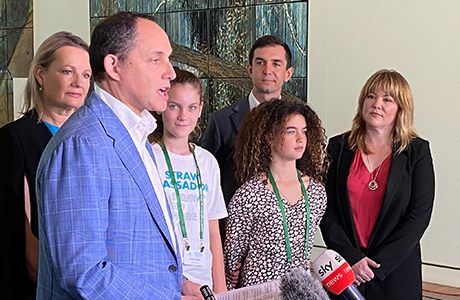
Australian packaging company Pact Group cements its leadership position in the Circular Economy. Pact Non-Executive Chairman Raphael Geminder said the commitment by Pact would involve significant investment in existing and new facilities over the next five years, with the company working collaboratively with government and like-minded partners to invest over $500M.
The pledge, made by Raphael Geminder at the National Plastics Summit 2020 in Canberra today, underpins Pact’s recently announced strategy to lead the circular economy. This will be done through significant investments in sustainable packaging, reuse and recycling initiatives. Packaging, reuse and infrastructure products play the most significant role in the Circular Economy as a home for the majority of plastics that are recycled. The Group is also investing further in innovation, technology and materials science capabilities to enable increased inclusion of recycled content.
“Pact is already Australia’s biggest recycler and user of recycled materials in the Southern Hemisphere – but we have ambitions to go much further,” Mr Geminder said.
“Our stated vision is to include 30% recycled content across our product portfolio by 2025. Across our business, this would be the equivalent of keeping nearly 2 billion plastic containers out of landfill.
“Just as importantly, we will be creating jobs for Australians in the circular economy – a new and growing sector where we believe Australia can lead the world.”
Last month, Pact announced it would join with Cleanaway Waste Management and Asahi Beverages to build a PET recycling facility capable of processing up to 28,000 tonnes of plastic waste a year. Under the agreement, Cleanaway will provide the source material from its collection facilities, Pact will provide the technical conversion expertise and Asahi and Pact will buy the majority of the recycled pellets to use in their own bottles and packaging products. The facility, earmarked for Albury-Wodonga on the NSW-Victorian border, will create approximately 30 jobs in the region.
Federal Minister for the Environment, the Hon. Sussan Ley MP, who is hosting the National Plastics Summit 2020, welcomed the investment commitment by Pact.
““We need to change the ways we use and re-manufacture plastic from both an environmental and business perspective,” Ms Ley said.
“The first National Plastic summit is about companies leading change, and I applaud Pact Group for their significant investment in Australia’s recycling economy and their vision for closing the loop on plastics.”
Since 2018, Pact has been pursuing three 2025 End of Waste Targets: to eliminate all non-recyclable packaging it produces; to find solutions to reduce, reuse and recycle all single use secondary packaging in supermarkets; and to offer 30 per cent recycled content across its packaging portfolio.
The company has made significant progress, with enormous benefits for its customers and the environment.
For example, Pact has cut consumption of expanded polystyrene – used in lightweight foam packaging – by 30 per cent and worked with New Zealand’s biggest supermarket chain, Foodstuffs, to transition all expanded polystyrene foam trays to recycled PET, diverting 120 million single use trays from landfill.
Products such as Earthwise and Omo laundry liquid and Tresemme shampoos and conditioners now come in bottles made from Pact’s recycled resin.
Our wheelie bins, which support consumer recycling schemes in every home, state and territory, are already made of 40 per cent recycled material and we want to take that to 80 per cent by 2025.
“Reducing plastic waste requires investment and commitment at every stage of the supply chain,” Mr Geminder said. “At Pact, we recognise that packaging has a critical role in the circular economy as a destination for recovered materials, which can be reused and recycled again and again. That is why we are determined to take a leadership position and play our part. We decided to act when we set our 2025 targets and I am delighted by the progress that we have made in a relatively short timeframe. It is now time for others to embrace this change, work collaboratively and take action”.


